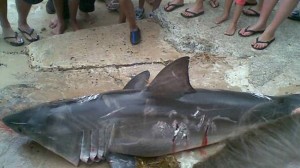Hefty fine for killing juvenile Great White Shark in New South Wales, Australia
Media Release
NSW Department of Primary Industries
13. Februrary 2014
————————–
Great White Shark killer fined $18,000
A man who killed a juvenile Great White Shark by deliberately striking it with his boat at Sussex Inlet has been fined more than $18,000 including court costs.
Department of Primary Industries (DPI) Director of Fisheries Compliance, Glenn Tritton, said the 40-year-old man from Glenbrook was found guilty of harming a threatened species when the matter was heard in Wollongong Local Court last week.
“Great White Sharks are protected in Australian waters, they are listed as a threatened species in NSW which means it is illegal to catch and keep, buy, sell, possess or harm great white sharks and their habitats,” Mr Tritton said.
It was alleged that the following incident took place in January 2012 at Sussex Inlet:
- A shark was seen in the area and was actively pursued by a boat.
- Witnesses stated to DPI fisheries officers the 40-year-old man deliberately used his boat to hit the shark several times while herding it into shallow water.
- The shark sustained the majority of its injuries from the boat’s propeller.
- A rope was tied onto the shark’s tail.
- A second boat then towed the shark back to a boat ramp.
- The shark was then hit on the head with a metal pole several times.
The magistrate fined the 40-year-old man $8 000 and costs of $8 865 for professional and $1 238 for witness costs.
The master of the second vessel which towed the shark was also charged with harming a threatened species. He entered a plea of guilty and received a six month good behaviour bond.
Mr Tritton said the fines serve as a warning for persons engaged in this type of irresponsible behaviour.
“This conviction sends a strong message that harming of our threatened species will not be tolerated – everyone needs to know the rules and ignorance is no excuse,” he said.
“Great white sharks are found along the NSW coastline and as apex predators at the top of the food chain, they play an important role in marine ecosystems.
“The low population numbers following historical exploitation, plus their low reproductive rate, long gestation and late age at sexual maturity lead to slow recovery of the great white shark population and demonstrate the need for its protection.”
Source: NSW DPI
Note by Shark Year Magazine:
Please see the related article, published in 2012 :
13. January 2012, Young Great White Shark killed in NSW Australia

